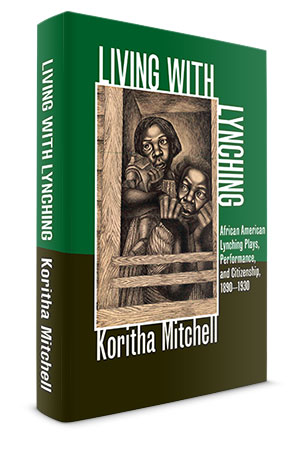
Living with Lynching: African American Lynching Plays, Performance, and Citizenship, 1890-1930
The first full-length critical study of lynching plays in American culture.
Living with Lynching: African American Lynching Plays, Performance, and Citizenship, 1890–1930 demonstrates that popular lynching plays were mechanisms through which African American communities survived actual and photographic mob violence. Often available in periodicals, lynching plays were read aloud or acted out by black church members, schoolchildren, and families. Koritha Mitchell shows that African Americans performed and read the scripts in community settings to certify to each other that lynching victims were not the isolated brutes that dominant discourses made them out to be. Instead, the play scripts often described victims as honorable heads of households being torn from model domestic units by white violence.
In closely analyzing the political and spiritual uses of black theatre during the Progressive Era, Mitchell demonstrates that audiences were shown affective ties in black families, a subject often erased in mainstream images of African Americans. Examining lynching plays as archival texts that embody and reflect broad networks of sociocultural activism and exchange in the lives of black Americans, Mitchell finds that audiences were rehearsing and improvising new ways of enduring in the face of widespread racial terrorism. Images of the black soldier, lawyer, mother, and wife helped readers assure each other that they were upstanding individuals who deserved the right to participate in national culture and politics. These powerful community coping efforts helped African Americans band together and withstand the nation’s rejection of them as viable citizens.
Winner of the American Theatre and Drama Society (ATDS) Book Award, 2012.
Winner of the Society for the Study of American Women Writers (SSAWW) Book Award, 2012.
![]()
Required reading for understanding the ways in which narrative and performance have been central to challenging white oppression as well as (re)imagining black identity in America. Highly recommended.” — Choice
If ever a lynching book could be described as beautiful, it would undoubtedly be Mitchell’s for the gracious way she takes care to read, generously and meticulously, all that she sees and hears (as well as what she does not see and hear) when she enters the homes that these characters have struggled to build for themselves.” — Signs
Mitchell expertly brings in critical approaches from literary and performance studies to show how concepts such as ‘circulation’ and ‘impact’ held different meaning for citizens trying to survive traumatic events. . . . Her study offers significant new insights into a key historical movement and provides a model of academic scholarship.” — American Historical Review
Offers cogent insights into the cultural work of creative expression in a context of racial violence.” — The Journal of American History


